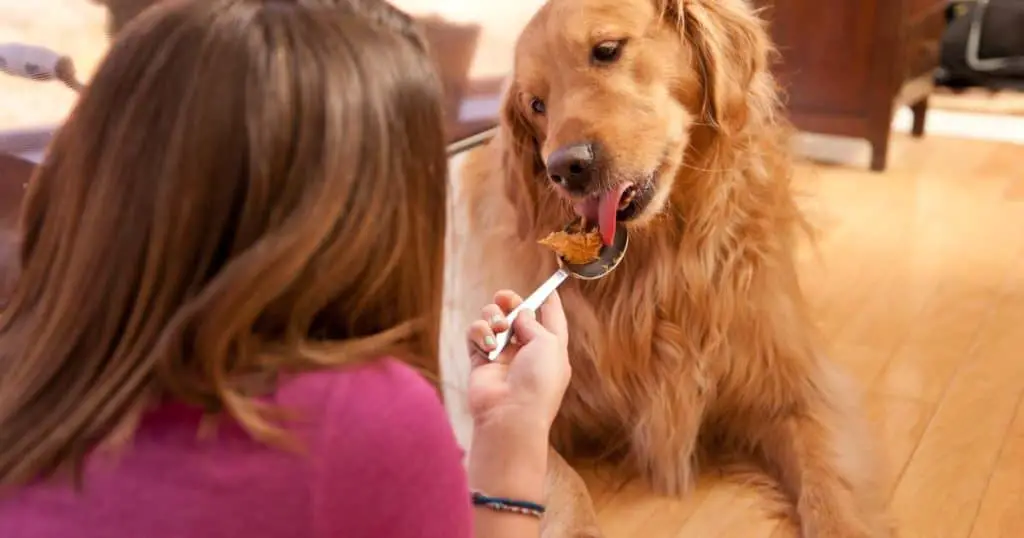Table of Contents
Many dog owners love to treat their furry friends with peanut butter. It’s a tasty and convenient snack that can be used to hide medication or as a reward during training. However, some pet owners may wonder if dogs can be allergic to peanut butter.
While peanut butter is generally safe for dogs to eat, it’s important to be aware of the potential risks. Some dogs may have an allergic reaction to peanuts, which can cause a range of symptoms from mild itching to life-threatening anaphylaxis. Additionally, some brands of peanut butter may contain xylitol, a sugar substitute that is toxic to dogs.
In this article, we’ll explore the topic of dogs and peanut butter allergies. We’ll discuss the signs and symptoms of an allergic reaction, the risks associated with xylitol, and how to safely give peanut butter to your dog. By the end of this article, you’ll have a better understanding of whether or not peanut butter is a safe treat for your furry friend.
What is Peanut Butter?

Peanut butter is a popular spread made from ground peanuts. It is a frequent ingredient in many human foods and is known for its rich, creamy texture and nutty flavor. Peanut butter is a great source of protein, healthy fats, vitamins B and E, and niacin.
While peanut butter is a popular food for humans, many pet owners wonder if it is safe for their dogs to eat. Dogs love peanut butter just as much as humans do, but can dogs be allergic to peanut butter?
It is important to note that peanut butter itself is not a common allergen for dogs. However, some dogs may have an allergic reaction to peanuts or other ingredients used in peanut butter.
According to the American Kennel Club, most peanut butter is safe for dogs to eat in moderation. However, it is important to check the label and make sure the peanut butter does not contain xylitol, a sugar substitute that is toxic to dogs.
Common Allergies in Dogs
Dogs can be allergic to a variety of things, including food, pollen, and dust. Some common food allergies in dogs include beef, chicken, and dairy products. These allergies can cause a range of symptoms, from mild itching to severe anaphylaxis. It is important to be aware of the signs of an allergic reaction in your dog and to seek veterinary care if necessary.
Peanut Allergy
While peanut butter is a popular treat for dogs, it is possible for them to develop an allergy to it. Symptoms of a peanut allergy in dogs can include red and itchy skin, excessive licking, hair loss, agitation, and gastrointestinal disorders such as vomiting and diarrhea.
In severe cases, a dog may experience anaphylactic shock, which can be life-threatening. If you suspect your dog may be allergic to peanuts or peanut butter, it is important to consult with your veterinarian for proper diagnosis and treatment.
It is worth noting that peanut allergies are relatively rare in dogs. However, if your dog does have an allergy to peanuts, it is important to avoid feeding them peanut butter or any other products that contain peanuts.
Are Dogs Allergic to Peanut Butter?

Peanut butter is one of the most popular snacks for dogs. However, some dogs may be allergic to it. According to Canna-Pet, some dogs may not actually be allergic to peanuts, but they could have an immune system that is hypersensitive to one of the other ingredients in the peanut butter. One specific ingredient many canines are allergic to is Xylitol, which is found in some brands of peanut butter.
Symptoms of peanut butter allergies in dogs may include itching, redness, swelling, and hives on the skin, as well as vomiting, diarrhea, and difficulty breathing. If you suspect that your dog may be allergic to peanut butter, it is important to seek veterinary care immediately.
While peanut butter allergies in dogs are rare, they can still occur. According to Pet Keen, like humans, dogs can be allergic to any ingredient, including peanut butter. But in dogs, this allergy is quite rare, and the clinical signs are not that severe. To see if your dog is allergic to peanut butter, give them a tiny amount at first to see how they react.
If your dog is allergic to peanut butter, it is important to avoid giving them any products that contain peanuts or peanut butter. There are many other healthy and safe snacks that you can give your dog instead.
In summary, while peanut butter allergies in dogs are rare, they can still occur. If you suspect that your dog may be allergic to peanut butter, it is important to seek veterinary care immediately.
Symptoms of Peanut Butter Allergy in Dogs

Peanut butter is a popular treat for dogs, but some dogs may have an allergic reaction to it. Peanut butter allergies in dogs can manifest in a variety of ways. Here are some common symptoms to look out for:
Red and itchy skin: Dogs with peanut butter allergies may develop red, itchy skin. They may scratch or lick at their skin excessively, which can lead to hair loss and hot spots.
Bald spots: In addition to red, itchy skin, some dogs may develop bald spots due to excessive scratching or licking. These spots may be more noticeable in dogs with longer hair.
Hotspots: Hotspots are areas of the skin that are inflamed and infected. They can be caused by a variety of factors, including allergies. Dogs with peanut butter allergies may be more prone to developing hotspots.
Difficulty breathing: In severe cases, dogs with peanut butter allergies may have difficulty breathing. This is a sign of anaphylaxis, a life-threatening allergic reaction that requires immediate veterinary attention.
Hives and swelling: Dogs with peanut butter allergies may develop hives or swelling, particularly around the face and mouth. This can make it difficult for them to eat or breathe.
Collapse: In rare cases, dogs with peanut butter allergies may collapse. This is a sign of a severe allergic reaction and requires immediate veterinary attention.
It’s important to note that not all dogs will exhibit the same symptoms if they have a peanut butter allergy. Some dogs may only experience mild symptoms, while others may have a more severe reaction. If you suspect that your dog may be allergic to peanut butter, it’s important to consult with your veterinarian. They can help you determine the cause of your dog’s symptoms and recommend an appropriate course of treatment.
Diagnosing Peanut Butter Allergy in Dogs
Peanut butter allergies in dogs can be tricky to diagnose, as symptoms can vary from dog to dog. However, there are a few key signs to look out for that can help determine if your dog is allergic to peanut butter.
Firstly, if your dog experiences any gastrointestinal issues such as vomiting or diarrhea after consuming peanut butter, this could be a sign of an allergy. Additionally, if your dog experiences any skin irritations or excessive itching after consuming peanut butter, this could also be a sign of an allergy.
It’s important to note that these symptoms can also be caused by other factors, so it’s important to consult with a veterinarian to determine if your dog is truly allergic to peanut butter.
In some cases, a veterinarian may recommend an elimination diet to determine if your dog is allergic to peanut butter. This involves removing all potential allergens from your dog’s diet and slowly reintroducing them one by one to determine which one is causing the allergic reaction.
If a peanut butter allergy is suspected, a veterinarian may also perform a skin or blood test to confirm the diagnosis. These tests can help determine if your dog has an allergy to peanuts or other potential allergens.
Overall, if you suspect that your dog may be allergic to peanut butter, it’s important to consult with a veterinarian for proper diagnosis and treatment.
Treating Peanut Butter Allergy in Dogs
When it comes to treating peanut butter allergy in dogs, the most effective method is to avoid peanut butter altogether. This means that pet owners should check the ingredients of all dog treats and foods to ensure that peanut butter is not included, as even small amounts can trigger an allergic reaction in some dogs.
In some cases, temporary treatment methods may include the use of topical creams to help relieve the itching and inflammation associated with atopic dermatitis. Antihistamines may also be prescribed to help alleviate internal bodily reactions that commonly affect a pet’s ability to breathe.
It is important to note that while peanut butter allergies are relatively rare in dogs, it is still essential to take any signs of an allergic reaction seriously. Some common signs of an allergic reaction in dogs include itching, redness, swelling, vomiting, and diarrhea. If a pet owner suspects that their dog is experiencing an allergic reaction, they should seek veterinary attention immediately.
It is also worth noting that while peanut butter itself is not toxic to dogs, some brands may contain xylitol, a sugar substitute that is highly toxic and can cause seizures, liver failure, and even death in dogs. Therefore, pet owners should always read the labels of any peanut butter products they purchase for their dogs and avoid any that contain xylitol.
Preventing Peanut Butter Allergy in Dogs

Peanut butter can be a tasty treat for dogs, but it’s important to be cautious when introducing it into their diet. While most dogs can safely consume peanut butter, some dogs may have an allergic reaction to it.
Here are a few tips to prevent peanut butter allergy in dogs:
1. Introduce Peanut Butter Slowly
If you’re giving your dog peanut butter for the first time, start with a small amount and observe your dog’s reaction. If your dog shows any signs of an allergic reaction, such as itching, swelling, or difficulty breathing, stop giving them peanut butter immediately and consult your veterinarian.
2. Choose High-Quality Peanut Butter
When choosing peanut butter for your dog, opt for a high-quality, all-natural brand that doesn’t contain any additives or preservatives. Avoid peanut butter that contains xylitol, a sugar substitute that can be toxic to dogs.
3. Monitor Your Dog’s Consumption:
While peanut butter can be a healthy treat for dogs in moderation, it’s important to monitor your dog’s consumption. Too much peanut butter can lead to obesity and digestive issues. The recommended serving size for dogs is one tablespoon of peanut butter per day for every 10 pounds of body weight.
4. Consider Alternative Treats:
If your dog is allergic to peanuts or if you’re concerned about the potential for an allergic reaction, consider alternative treats. There are many healthy and delicious treats available for dogs that don’t contain peanuts or peanut butter.
By following these tips, you can help prevent peanut butter allergy in dogs and ensure that your furry friend stays healthy and happy.
Conclusion
While peanut butter is generally safe for dogs to consume, some dogs may be allergic to it. Symptoms of an allergic reaction can range from mild to severe and may include skin rashes, hives, difficulty breathing, and anaphylactic shock. It is important to monitor your dog after consuming peanut butter and seek veterinary care if any symptoms arise.
It is also important to note that not all peanut butter products are created equal. Some may contain additives such as xylitol, which is toxic to dogs. Always check the ingredients list before giving peanut butter to your dog and avoid any products that contain xylitol or other harmful ingredients.
If your dog is allergic to peanut butter, there are plenty of other healthy and delicious treats that they can enjoy. Carrots, apples, and blueberries are all great options that are safe for dogs to consume. Consult with your veterinarian to determine the best diet for your furry friend.
Related Articles:




Leave a Reply
You must be logged in to post a comment.